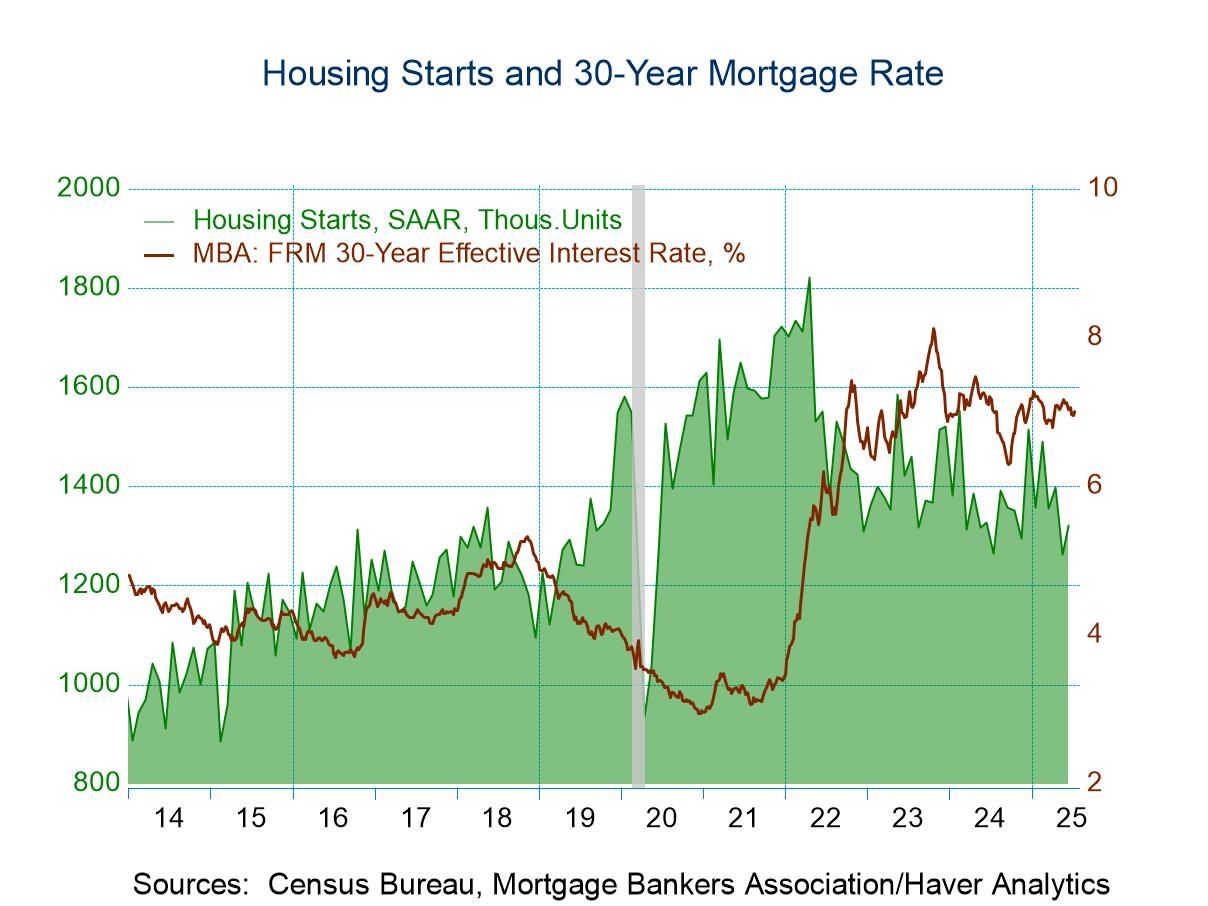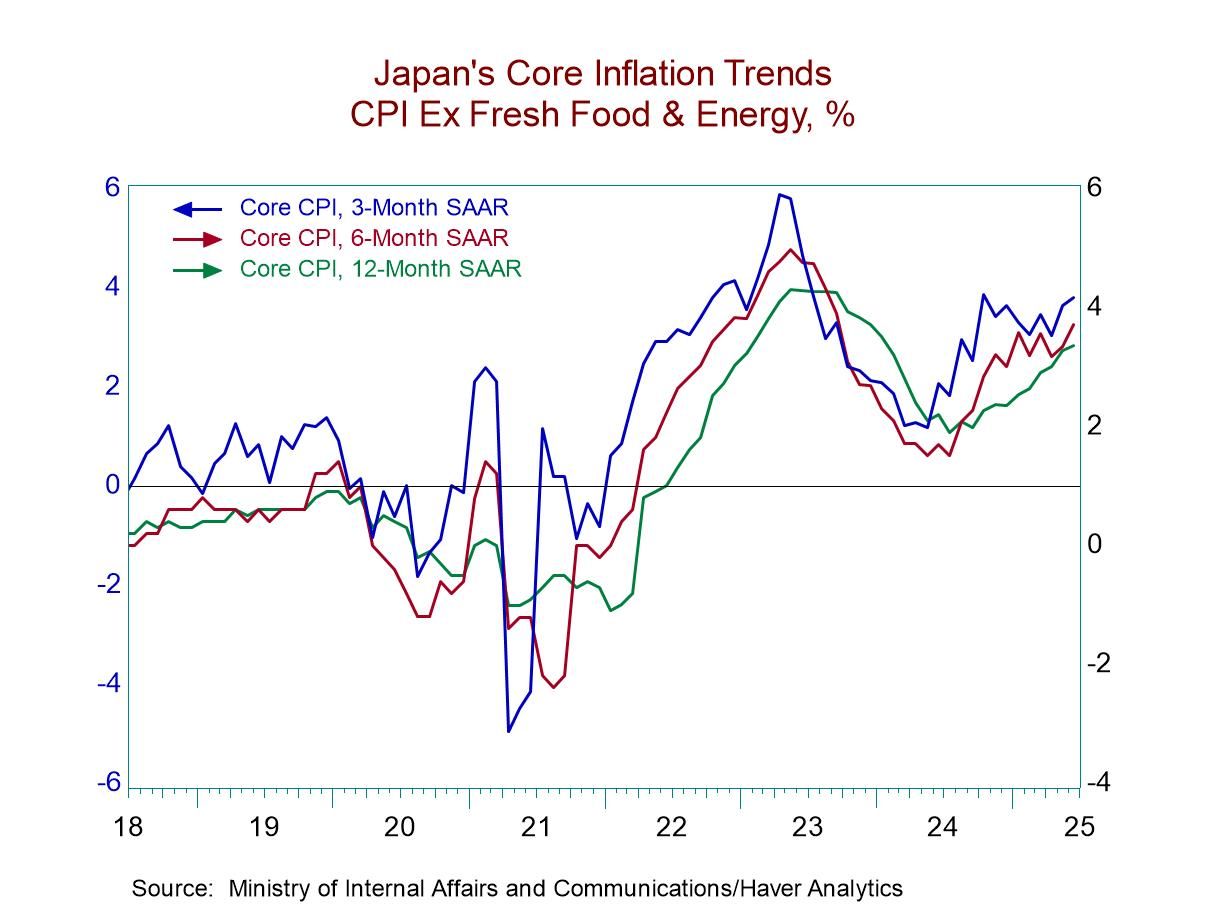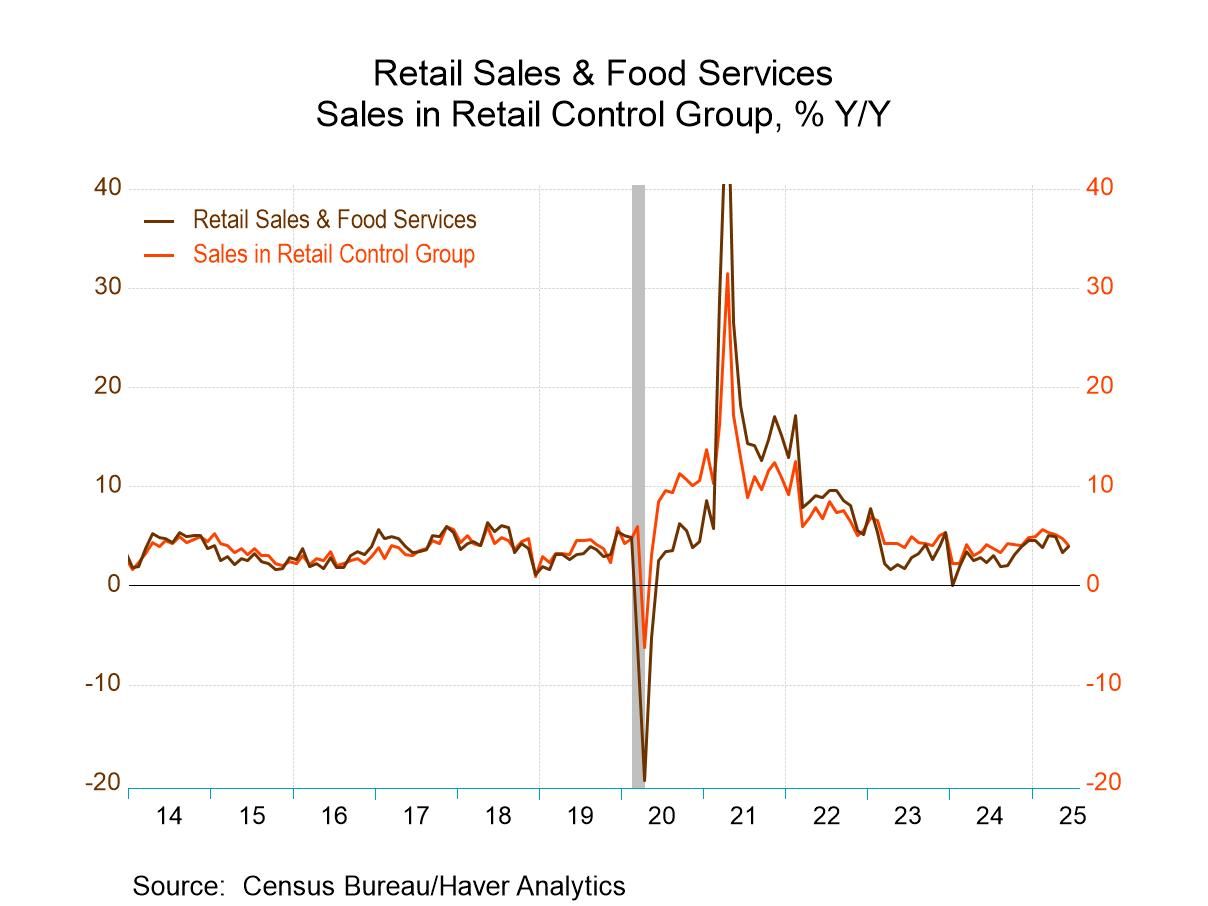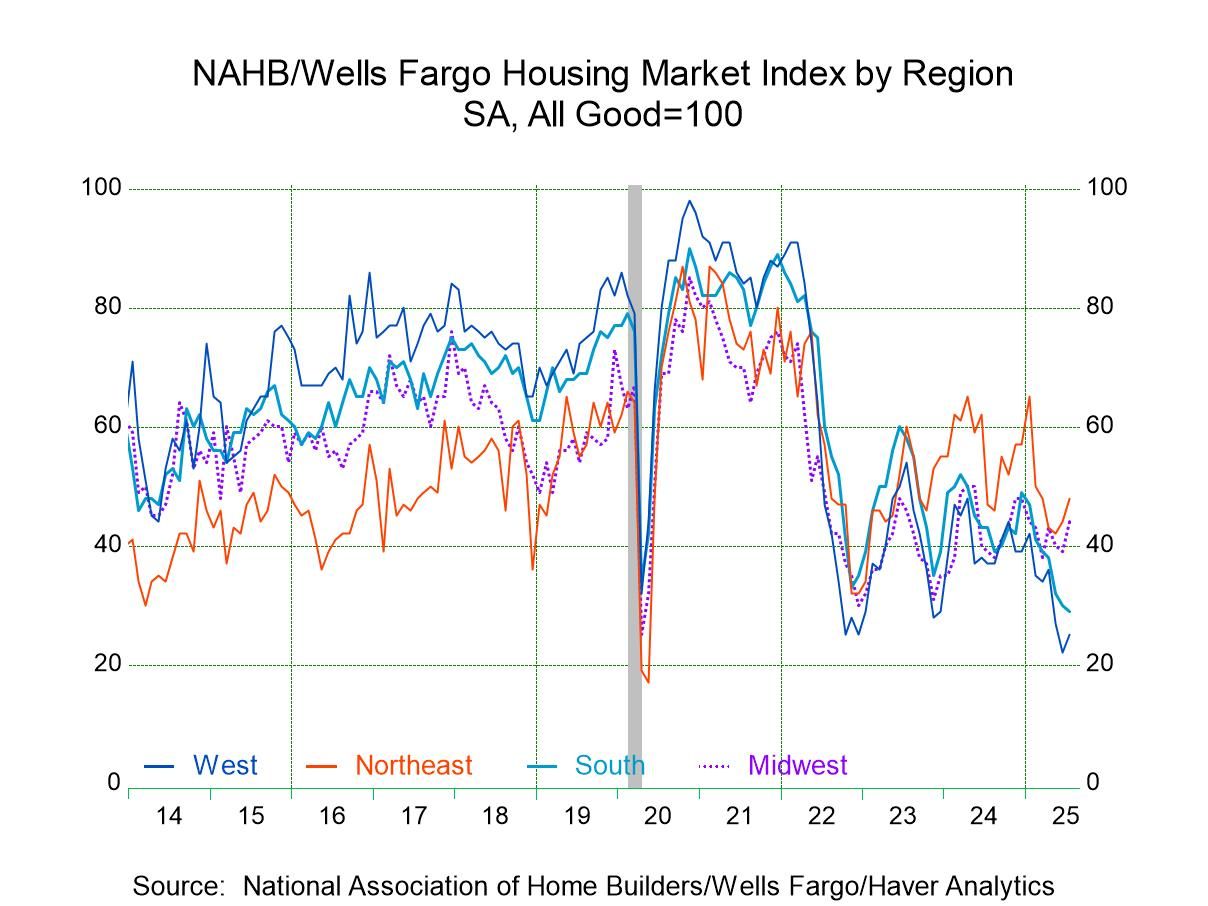 Global| Apr 06 2009
Global| Apr 06 2009Euro Area Inflation Is StillDropping Fast
Summary
EMU inflation drops at record pace in February. EMU inflation dropped in February after a very sharp drop in January. Over three-months the annual pace of decline is at -12% compared to -11% over six-months. This is a strong pace to [...]
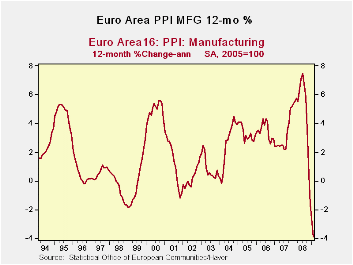
EMU inflation drops at record pace in February. EMU
inflation dropped in February after a very sharp drop in January. Over
three-months the annual pace of decline is at -12% compared to -11%
over six-months. This is a strong pace to stay in force over these two
periods. Over 12-months, inflation is off by 1.8% compared to being up
by 5.3% Yr/Yr one year ago. Thus average inflation over the past two
years is quite tame, under two percent.
A job well done…but. Central banks can be
content that despite all the angst, they handled the energy price spurt
well and did manage to keep inflation at bay. Still, inflation is well
under control and last week ahead of the G-20 meeting, the ECB gave the
markets a smaller rate cut than they had anticipated. Now with the
inflation numbers still showing declines the ECB is expected to be
cutting rates again.
Widespread drops, too. Inflation is falling
in Germany and in Italy at about the same pace as in EMU over the last
3 and 6 months. The UK has inflation falling fast over six months but
the pace of decline has let up over the past three-months.
| Euro Area and UK PPI Trends | ||||||
|---|---|---|---|---|---|---|
| M/M | Saar | |||||
| Euro Area | Feb-09 | Jan-09 | 3-Mo | 6-MO | Yr/Yr | Y/Y Yr Ago |
| Total ex Construction | -0.6% | -1.5% | -12.0% | -11.2% | -1.8% | 5.3% |
| Capital Goods | 0.0% | -0.2% | -0.6% | 0.6% | 1.7% | 1.6% |
| Consumer Goods | -0.2% | -0.8% | -5.0% | -3.6% | -0.5% | 4.7% |
| Intermediate & Capital Goods | -1.1% | -1.9% | -15.4% | -11.9% | -3.1% | 4.2% |
| MFG | -0.5% | -1.0% | -11.7% | -12.9% | -3.9% | 5.5% |
| Germany | -0.7% | -1.4% | -12.5% | -5.9% | 2.1% | 2.7% |
| Gy Ex Energy | -0.6% | -0.6% | -6.6% | -5.1% | -0.7% | 2.2% |
| Italy | -0.8% | -0.9% | -12.0% | -13.1% | -3.3% | 6.3% |
| UK | 0.4% | 0.7% | -5.2% | -14.7% | 2.1% | 13.1% |
by Louise Curley April 6, 2009
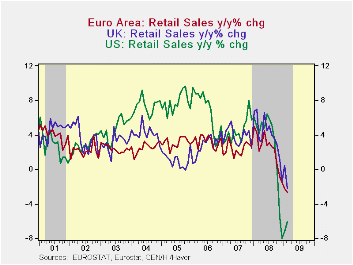
The value of retail sales excluding motor vehicles and
motorcycles in the Euro Area had risen each month since the series
began in 1995 until September of last year. (In the Euro Area, retail
sales, excluding motor vehicles and motorcycles, are reported in index
form with a base of 2005=100.) Since then, they have declined in four
of the five subsequent months. By February 2009, they were 2.7% below
February 2008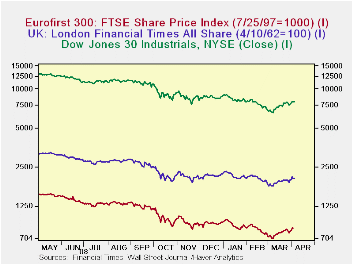
In general, retail sales tend to show increases in year to year growth reflecting the growing demands of an increasing population. Even in mild recessions, retail sales tend to increase. The growth in retail sales in the Euro Area has tended to be lower than that in either the UK or the US, as can be seen in the first chart. In the last four months retail sales in the Euro Area show much smaller declines in sales relative to the US but slightly larger declines than the UK. (The chart shows recession shading for the US.)
Good data for retail sales, like data on employment, production and such, take time to compile and by the time they are published, then current conditions may well have changed. Measures of consumer and business confidence help in judging current sentiment and they have recently shown some slight improvement. The stock markets also reflect economic sentiment and markets around the world have improved in the very recent past.. The second chart plots the daily price of stocks in the Euro Area, the UK and the US on a log scale.
| Retail sales ex motor vehicles and motor cycles (2005=100) | Feb 09 | Jan 09 | Dec 08 | Nov 08 | Oct 08 | Sep 08 | Feb 09/Feb 08 |
|---|---|---|---|---|---|---|---|
| EURO AREA | 105.97 | 106.38 | 106.10 | 106.59 | 107.36 | 108.70 | -2.66 |
| United Kingdom | 109.57 | 110.64 | 106.91 | 109.98 | 110.71 | 116.41 | -2.14 |
| United States | 107.72 | 106.76 | 105.12 | 108.94 | 112.42 | 116.16 | -6.04 |
Robert Brusca
AuthorMore in Author Profile »Robert A. Brusca is Chief Economist of Fact and Opinion Economics, a consulting firm he founded in Manhattan. He has been an economist on Wall Street for over 25 years. He has visited central banking and large institutional clients in over 30 countries in his career as an economist. Mr. Brusca was a Divisional Research Chief at the Federal Reserve Bank of NY (Chief of the International Financial markets Division), a Fed Watcher at Irving Trust and Chief Economist at Nikko Securities International. He is widely quoted and appears in various media. Mr. Brusca holds an MA and Ph.D. in economics from Michigan State University and a BA in Economics from the University of Michigan. His research pursues his strong interests in non aligned policy economics as well as international economics. FAO Economics’ research targets investors to assist them in making better investment decisions in stocks, bonds and in a variety of international assets. The company does not manage money and has no conflicts in giving economic advice.



